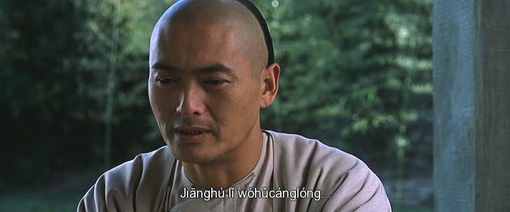Ang Lee (李安), the director of Brokeback Mountain, Crouching Tiger, Hidden Dragon, The Ice Storm, Sense and Sensibility, Eat Drink Man Woman, and many other films, was recently back here in his homeland of Taiwan.
I’ve long wondered how Lee ended up with such an odd form for the romanization of his name. I’m not referring to the spelling of his family name, Lee. Although the Anglicization of “Lee” for 李 is not standard in any of the main romanization systems, that particular spelling is almost certainly more common in Taiwan than “Li,” which is the form in most romanization systems other than Gwoyeu Romatzyh. In Gwoyeu Romatzyh, which nominally was Taiwan’s official romanization system until 1986 — long after Lee acquired a passport and had gone to the United States — Lǐ is written Lii; but I’ve never seen that spelling used for a name here.
No, what puzzles me is the g in his given name of “Ang.” In Mandarin, this is one of those relatively rare syllables spelled the same in basically all of the main romanization systems: an. So where is that g from? (Please don’t read through the rest of this message in any kind of suspense, because I still don’t know the answer to that question, though I’m hoping one of my readers will.)
For those unfamiliar with Mandarin, Ang Lee’s given name is not originally pronounced like American English’s bang without the b or sang without the s. Rather, the a is similar to that in the English word father; the n is about as you’d expect; and there’s no g. So the name is pronounced something like the French (not English) version of Anne or the end of the German Autobahn.
The Ang spelling doesn’t appear to come from Taiwanese. Even in Taiwanese 安 would be romanized as an, not ang, in the dominant systems. (Correct me if I’m wrong, please. I know almost no Taiwanese.) Also, at the time Lee would have adopted the Ang spelling, the use of Taiwanese romanization for names would most certainly have been intensely frowned upon by the authorities if not forbidden outright. Moreover, I don’t think Lee is even ethnically Taiwanese/Hokkien.
Of course, he may have chosen to use a spelling other than what he was made to use on his passport. But people in Taiwan seldom do that unless they adopt an “English” name, which “Ang” is certainly not. The g might be there to help prevent people from thinking he’s a woman named Ann. But if that were the concern, why not simply adopt an English name?
Poagao, who met Ang Lee in Taipei last week, met back in September with Lee’s little brother, who’s known as Khan (or perhaps Kan) Lee. As Poagao notes, there’s something strange with that name, too:
One thing I’d like to know is why “Ang” gets an unneccesary ‘g’ (it should be “An”), while “Kan” is one ‘g’ short (it should be “Kang”). Did Ang steal his little brother’s ‘g’ at some point?
Ang Lee’s brother’s name is Lǐ Gǎng in Hanyu Pinyin. (Theoretically, it could also be Lǐ Gàng or Lǐ Gāng because 崗 is one of many Chinese characters with multiple pronunciations.) The use of k rather than g comes from the Wade-Giles romanization system. In Taiwan, most people’s passports have names romanized using improper, bastardized Wade-Giles, which helps create a lot of confusion — as if Wade-Giles itself weren’t confusing enough already. Moreover, Taiwan’s passport office operates on the principle of chabuduo jiu keyi, which in this context is a close approximation of the English saying “close enough for government work.” In other words, if a spelling looks more or less correct it will probably pass — unless, that is, it has Hanyu Pinyin’s x or q in it, in which case it would probably be rejected. (I’m not making this up. I’ve spoken with people in the passport office about this.)
In looking through Lee Ang’s biography I noticed that he has two sons, one of whom is named “Haan,” at least according to the Internet Movie Database’s credits for Pushing Hands, one of Lee’s early movies. At first, I thought this might be a two-syllable given name that had been run together: Ha’an (or Ha-an, following the style used in Taiwan). Could this be the same an as in Ang Lee’s name — just this time without the mysterious g? But it turns out that Haan is a one-syllable name.
Here’s the character: 涵.
A doubled vowel in romanized Mandarin usually indicates the use of Gwoyeu Romatzyh’s tonal spelling. But the “Haan” spelling would be for third tone, while Haan’s name should be pronounced with a second tone. (This would be written “Harn” in Gwoyeu Romatzyh.)
So perhaps the IMDB entry is a typo, and the real spelling should be Han, as expected. Or maybe those in the Lee family just like funny spellings.

